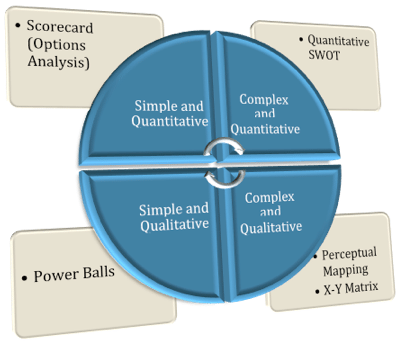Facilitating for-profit business plans and requirements captures substantially different challenges than facilitating a Kum-Ba-Yah community forum or other volunteer-based meetings. While active listening serves both scenarios, decision-making that supports most business initiatives differs from win-lose voting methods.
Frequently, business facilitators are not seeking agreement, but rather harmony. The difference follows. Agreement suggests that everyone is singing the same note, perhaps even with the same instrument. Boring. Reminiscent of the railroad industry trying to protect itself, rather than redefining its role as transportation and logistics.
Harmony implies we are seeking an outcome where everyone’s musical note or expression is heard, from whatever instrument they play. Successful facilitation provides appropriate structure so that the deliverable captures all instruments and all tones, like a symphony. The sound of cicadas every few years represents agreement. The music of Pyotr Tchaikovsky reflects a symphonic movement.
Structured Decision-Making
When seeking consensual understanding, as in decision-making, for example, the right structure makes it easier for your participants. Consider the PowerBall approach when you can help drive a group toward a simple decision surrounding a well-articulated question (e.g., What should we buy?).
For complicated situations, use the Scorecard approach that separates fuzzy from SMART criterion. By applying weightings you generate a quantitative score to compare your options. For highly complex situations like portfolio management, always embrace the TO-WS (SWOT) analysis (introduced to the MGRUSH workshops in its quantitative form in 2004). In the facilitator’s world, our approach to TO-WS is like comparing a Tchaikovsky composition to playing the same note over and over on a kazoo.
Harmony Over Agreement
As facilitators, our business constraints rarely afford the time and luxury of sitting around the campfire singing Kum-Ba-Yah and building trust. Therefore, build your structure in advance. Then lead the method best suited to reconcile the business challenges and trade-offs you expect. Everyone agreeing will keep you in the box, suffocating innovation. But with harmony, you don’t even see the box, as you lead to the creation of a solution that no single participant envisioned when they entered your workshop.
______
Don’t ruin your career by hosting bad meetings. Sign up for a workshop or send this to someone who should. MGRUSH workshops focus on meeting design and practice. Each person practices tools, methods, and activities every day during the week. Therefore, while some call this immersion, we call it the road to building high-value facilitation skills.
Our workshops also provide a superb way to earn up to 40 SEUs from the Scrum Alliance, 40 CDUs from IIBA, 40 Continuous Learning Points (CLPs) based on Federal Acquisition Certification Continuous Professional Learning Requirements using Training and Education activities, 40 Professional Development Units (PDUs) from SAVE International, as well as 4.0 CEUs for other professions. (See workshop and Reference Manual descriptions for details.)
Want a free 10-minute break timer? Sign up for our once-monthly newsletter HERE and receive a timer along with four other of our favorite facilitation tools, free.

Terrence Metz, president of MG RUSH Facilitation Training, was just 22-years-old and working as a Sales Engineer at Honeywell when he recognized a widespread problem—most meetings were ineffective and poorly led, wasting both time and company resources. However, he also observed meetings that worked. What set them apart? A well-prepared leader who structured the session to ensure participants contributed meaningfully and achieved clear outcomes.
Throughout his career, Metz, who earned an MBA from Kellogg (Northwestern University) experienced and also trained in various facilitation techniques. In 2004, he purchased MG RUSH where he shifted his focus toward improving established meeting designs and building a curriculum that would teach others how to lead, facilitate, and structure meetings that drive results. His expertise in training world-class facilitators led to the 2020 publication of Meetings That Get Results: A Guide to Building Better Meetings, a comprehensive resource on effectively building consensus.
Grounded in the principle that “nobody is smarter than everybody,” the book details the why, what, and how of building consensus when making decisions, planning, and solving problems. Along with a Participant’s Guide and supplemental workshops, it supports learning from foundational awareness to professional certification.
Metz’s first book, Change or Die: A Business Process Improvement Manual, tackled the challenges of process optimization. His upcoming book, Catalyst: Facilitating Innovation, focuses on meetings and workshops that don’t simply end when time runs out but conclude with actionable next steps and clear assignments—ensuring progress beyond discussions and ideas.




